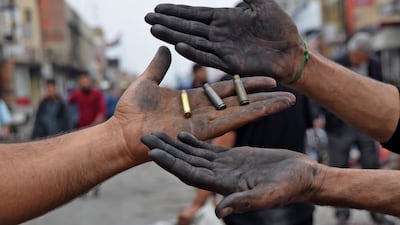Violence erupted in Iraq’s south over the weekend, continuing the government’s struggle to contain a year-long protest movement before next year's early elections, and risking a full-blown Shiite-Shiite conflict.
On Friday, the followers of the firebrand cleric Moqtada Al Sadr stormed a protest encampment in the southern city of Nasiriyah, burning tents and attacking protesters with bullets, knives and batons.
At least seven protesters have been killed since Friday in Nasiriyah and nearby Kut city, despite a curfew imposed by authorities, police and health officials said.
More than 50 others were wounded, they said.
Earlier, thousands of Mr Al Sadr’s followers gathered in Baghdad and other cities to show support for their leader.
He called on them to take part in the elections to secure major wins that would enable them to take the post of prime minister.
"They have realised that their popular support has diminished remarkably and that most of the people are thinking differently now, so they are trying to quell the protests," cleric Asaad Al Nassiri, a prominent activist in the southern city of Nasiriyah, told The National.
Since October 2019, Iraqis have been demonstrating for basic services, an end to endemic corruption and the removal of the ruling elite, of which Mr Al Sadr’s followers are major players.
Mr Al Sadr, who backs the biggest parliamentary bloc, supported the protests when they started, calling for the resignation of the government and for early elections.
But in late January, he withdrew his backing because of the criticism he faced as part of the political elite.
The interim government has suggested national elections could be held in June next year, one of the protesters’ key demands. That date is yet to be approved by Parliament.
Almost 600 protesters have been killed and thousands of others wounded by security forces, and targeted killings of activists by unknown groups since the protests began in 2019.
Demonstrators have accused Sadrist militias of putting down the protests.
Mr Al Nassiri said the Sadrists want to end the protests in Nasiriyah because they consider it them to be a threat.
The coronavirus and violence against demonstrators has seen the movement slow elsewhere but it endures in Nasiriyah,
In Baghdad, security troops have dismantled protest camps.
The tribal support the protests have in the south of the country has helped the movement to stay alive. For some events, influential tribes offered to protect protest camps.
Further confrontations between the movement and Sadrists could pull in tribes and spark in-fighting.
The city was the scene of a bloody event in November last year when security forces opened fire on protesters, killing nearly 30. That forced the former government to resign days later.
In a bid to calm the latest escalation, Prime Minister Mustafa Al Kadhimi sacked the Nasiriyah provincial police chief, whose troops were accused of not trying to stop the violence.
Authorities also imposed a curfew hours after the confrontations but protesters defied it, returning to the city’s Haboubi Square where they set up tents.
On Sunday, Mr Al Kadhimi ordered the creation of a crisis team with a wide mandate, led by the National Security Adviser.
It will work to “protect peaceful protesters, government buildings and private properties in order to cut the road for those who want to stir up sedition", he said.
Since the 2003 US-led invasion that toppled Saddam Hussein, Mr Al Sadr has emerged as a kingmaker in the political process given the wide support he holds among mainly impoverished Shiites.
For decades, his followers have secured enough seats in Parliament to give them a vital role in forming governments.
Last week, the protesters established a unified leadership as a “seed for a bigger coalition of independent candidates to run the elections", Mr Al Nassiri said.
The process is still in its early stages.
As elections draw closer, the situation is likely to deteriorate further.
“Iraq is going through fundamental political changes,” said Hadi Marie, chairman of the Political Decision Centre think tank in Baghdad.
“The Sadrist movement has ambitions now to win the next elections and to lead the government and that could lead to further confrontations with the protesters."
Such confrontation is what other rivals are eager to see, Mr Marie said.
“Other Shiite political parties have lost their public support, are accused of corruption and seen as collaborators in suppressing the protests," he said.
"They see such a confrontation between Sadrists and protesters as a chance to weaken both of them to clear the way.
“Everything is possible in Iraq. It is possible to see more protests, confrontations, assassinations and bombings."


